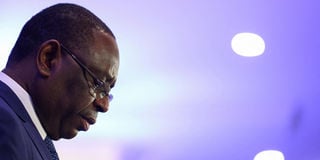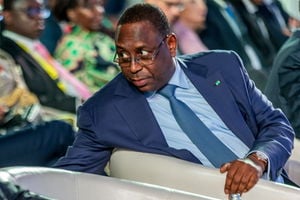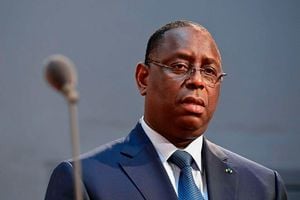
Senegal's President Macky Sall.
Regardless of what happens now, Senegal is already in uncharted waters.
According to last week's ruling by the Constitutional Council, President Macky Sall will step down by April 2, 2024, at the latest.
He reassured Senegalese in a national address following the ruling, which has been praised both locally and internationally for putting the country back on track.
But not everyone is happy. Concerns centre on the president's failure to announce a date for the elections as a matter of urgency.
And time, some political observers say, is of the essence if the country is to avoid a crisis arising from this situation.
Brian Kagoro, managing director for programmes at the Open Society Foundation, says Senegal is also under pressure to fund the elections.
"The most urgent business in Senegal at the moment is to ensure that the state has adequate financing to hold the elections," he told the Nation in an interview on Friday.
"The second most urgent business is to ensure that the voter's role is credible and acceptable to the contesting parties. This will require the support of the Economic Community of West African States (Ecowas) and the African Union, as well as the wider international community.
President Sall plunged Senegal into this crisis when he unilaterally announced the postponement of elections originally scheduled for February 25. He blamed the decision on a dispute between the House of Assembly and the Constitutional Council, the body that regulates electoral matters. The council has been dogged by allegations of corruption, including among lawmakers after it published its final list of approved candidates for the presidential election.
Senegalese constitutional lawyer and activist Ibrahima Kane says it should be easy for Senegal to get out of this quagmire if the date for the elections is known immediately after the Constitutional Council's decision.
"According to our constitution, the minimum number of days required for a presidential election is 30 and the maximum is 45. As of today, there are more than 40 days until April 2. So if the days are known, it would be very easy to organise the first and second round of the election," Mr Kane told the Nation on Friday.
But he complained that President Sall was moving too slowly for a country in such a hurry, noting that not only did the president wait two days to acknowledge the council's decision, but he also took a week to speak about it and call for dialogue, losing crucial time.
Sall said he wanted to organise a dialogue to iron out differences and ensure that the outcome of the elections was accepted by all.

Senegalese demonstrators protest against the postponement of the February 25 presidential election, in Dakar, Senegal February 9, 2024.
However, his decision only further divided the nation, sparking nationwide protests, destruction and deaths.
The Constitutional Council later issued a ruling overturning the president's decision. But it left the crucial issue of announcing the date in the hands of competent authorities, which is effectively the president.
According to the Senegalese constitution, setting the date for elections is the prerogative of the Executive. The president is expected to set a date in consultation with the relevant parties, and the Ministry of the Interior organises the elections.
All eyes are now on President Macky Sall to announce the next date for these elections as the clock ticks down.
According to the presidency, crucial meetings will take place this Monday and Tuesday as part of political dialogue.
Some observers hope that the dialogue will lead to the setting of a date for the elections. But the mass boycott of these meetings has already clouded that prospect.
Despite being hailed as one of the few stable democracies in Africa, Senegal has had its fair share of political tensions, including during the election period. But according to Kane, this is the most worrying of them all, to the point where there is talk of the possibility of an interim president if the country does not get a new president by April 2.
The F25, a loose coalition of 16 of the 19 candidates approved by the Constitutional Council, is one group that believes that an interim president presiding over the elections is the only smooth way out of this situation.
The constitution provides for the speaker of the National Assembly to step in and stay for 90 days, during which elections can be organised.

A Senegalese demonstrator gestures as other are filming during clashes with riot police as they protest against the postponement of the February 25 presidential election, in Dakar, Senegal February 9, 2024.
According to F25 spokesman Déthié Fall, the dialogue is a political ploy by Sall to achieve a hidden agenda, which they can't legitimise by attending.
The group is unhappy that Sall has ruled out stepping down before the end of his term, and they don't seem to believe that it is possible to hold elections and install the newly elected leader within the constitutional time-frame with Sall at the helm until the last day of his term.
"It is out of the question for us to come together to acknowledge your resonance and find a way to keep you. We won't do it and we won't give you that opportunity," Mr Fall said at a press conference on Friday.
Another constitutional lawyer, Professor Babacar Guèye, hopes that the dialogue will lead to a date or that the Constitutional Council will have to step in again.
Amid the uncertainty over these issues, international concern over the situation in Senegal continues.
The Open Society Foundations call on all stakeholders to respect the decision of the Council and to ensure that the elections are peaceful, credible, inclusive and transparent. The Foundations are also concerned about the timely organisation of the elections.

A boy runs past barricades as Senegalese demonstrators clash with riot police during a protest against the postponement of the February 25 presidential election, in Dakar, Senegal February 4, 2024. (inset) President Macky Sall.
"The Constitutional Council's landmark decision reaffirms the country's commitment to the rule of law and Senegal's reputation as a bastion of democracy and promoter of open societies in Africa," said Binaifer Nowrojee, vice president of the Foundations, in a statement in response to the Council's decision.
"The next step is for the national institutions in charge of the electoral process to uphold the Constitutional Council's decision, urgently announce new election dates, and organise free, fair, and credible elections in accordance with relevant Senegalese, Ecowas, and AU norms and standards," he added.


